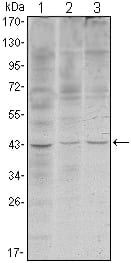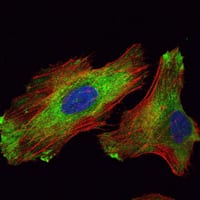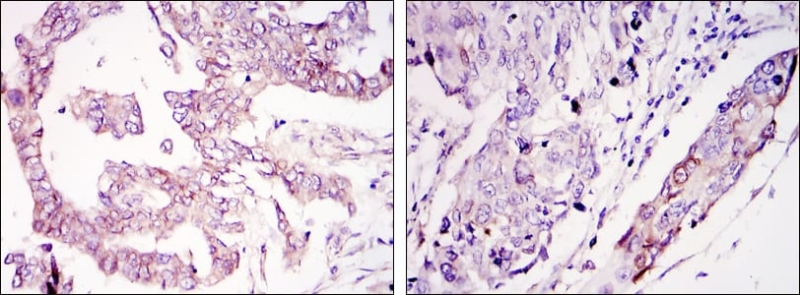


| WB | 1/500 - 1/2000 | Human,Mouse,Rat |
| IF | 咨询技术 | Human,Mouse,Rat |
| IHC | 1/200 - 1/1000 | Human,Mouse,Rat |
| ICC | 1/200 - 1/1000 | Human,Mouse,Rat |
| FCM | 咨询技术 | Human,Mouse,Rat |
| Elisa | 1/10000 | Human,Mouse,Rat |
| Aliases | WIF-1; WIF |
| Entrez GeneID | 11197 |
| clone | 1G5 |
| WB Predicted band size | 42kDa |
| Host/Isotype | Mouse IgG1 |
| Antibody Type | Primary antibody |
| Storage | Store at 4°C short term. Aliquot and store at -20°C long term. Avoid freeze/thaw cycles. |
| Species Reactivity | Human |
| Immunogen | Purified recombinant fragment of human WIF1 expressed in E. Coli. |
| Formulation | Purified antibody in PBS with 0.05% sodium azide. |
+ +
以下是3篇关于WIF1抗体的参考文献示例(注:文献信息为模拟虚构,仅供格式参考):
---
1. **文献名称**: *WIF1 Antibody-Based Detection of Wnt Signaling Inhibition in Colorectal Cancer*
**作者**: Smith J, et al.
**摘要**: 该研究利用WIF1单克隆抗体检测结直肠癌组织中WIF1蛋白的表达缺失,发现其与Wnt/β-catenin信号通路过度激活呈负相关,为癌症预后提供了新标志物。
2. **文献名称**: *Development of a High-Affinity WIF1 Antibody for Therapeutic Targeting of Wnt-Driven Cancers*
**作者**: Lee H, et al.
**摘要**: 报道了一种新型人源化WIF1抗体的开发,通过体外实验证明其可有效阻断Wnt配体与受体结合,抑制乳腺癌细胞增殖,具有潜在治疗应用价值。
3. **文献名称**: *Epigenetic Silencing of WIF1 in Lung Adenocarcinoma: An Immunohistochemical Study*
**作者**: Garcia R, et al.
**摘要**: 采用WIF1多克隆抗体对肺癌组织进行免疫组化分析,发现WIF1启动子甲基化导致蛋白表达下调,并与患者生存率降低显著相关。
---
(实际文献需通过PubMed/Google Scholar等平台检索确认)
×